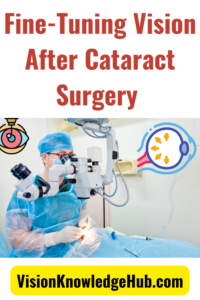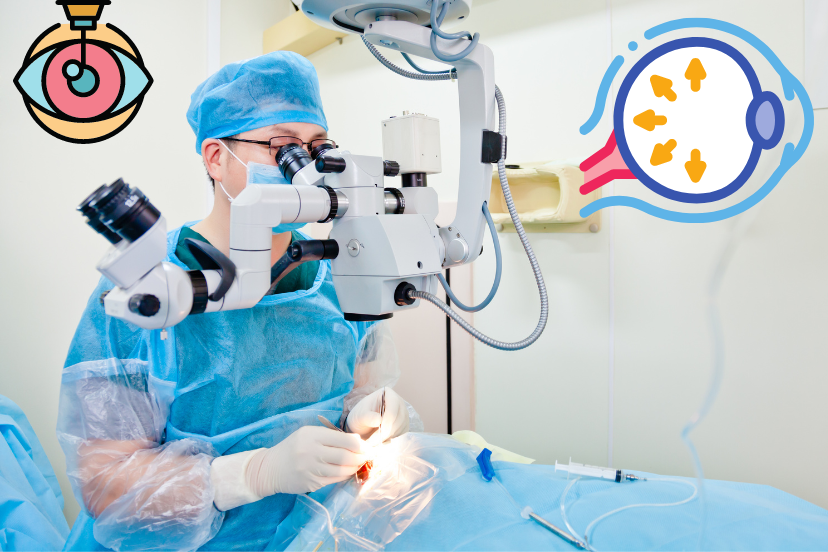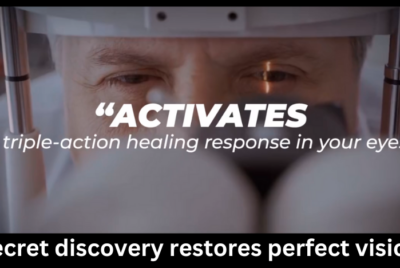Fine-Tuning Vision After Cataract Surgery
Cataract surgery is a remarkable medical procedure that can restore clear vision and improve the quality of life for individuals affected by cataracts. After undergoing this surgery, taking specific steps to fine-tune and optimize the visual outcome is crucial. As someone passionate about vision health and eager to provide helpful suggestions, I would like to share valuable advice on fine-tuning vision after cataract surgery.
Introduction
How to achieve the best possible vision following cataract surgery?
What Is Cataract Surgery
Cataract surgery involves removing the clouded natural lens of the eye and replacing it with an artificial intraocular lens (IOL). While the surgical procedure itself is highly effective in removing cataracts, the recovery phase plays a significant role in determining the final visual outcome.
By understanding the importance of post-operative care and taking necessary precautions, individuals can experience improved vision and regain their independence.
Preparing For Vision Improvement
Before the surgery, it is essential to consult with an experienced ophthalmologist who will guide you through the process. They will evaluate your eye health, determine the most suitable IOL for your needs, and provide instructions for the pre-operative period. Familiarize yourself with the recovery process, including any restrictions or precautions you need to follow. You can confidently approach the surgery and its aftermath by being well-prepared and informed.
Adapting To Vision Changes
Immediately after cataract surgery, it is common to experience temporary visual fluctuations. These fluctuations may include blurred vision, halos around lights, or mild discomfort. These changes occur as your eyes adjust to the newly implanted IOL. Be patient and give yourself time to adapt. It is crucial to follow your doctor’s advice regarding using prescription glasses or contact lenses during this period. Keep in mind that your eyes are healing, and the clarity of your vision will gradually improve.
Protecting And Enhancing Vision
To protect your eyes and enhance the healing process, consider wearing sunglasses that provide adequate UV protection whenever you go outside. Excessive exposure to sunlight can increase the risk of complications and delay the healing process. Additionally, be mindful of your screen time and ensure proper lighting when reading or using electronic devices. Taking regular breaks and practicing good lighting habits can reduce eye strain and optimize visual comfort.
Improve Your Visual Function
Incorporating eye exercises recommended by your ophthalmologist can further strengthen your eye muscles and improve overall visual function. Furthermore, maintaining good eye hygiene, such as avoiding rubbing your eyes and keeping them clean, can reduce the risk of infection and promote faster healing.
Addressing Common Concerns
During the recovery period, you may encounter certain visual concerns. Dry eyes are a common occurrence after cataract surgery and can cause discomfort and irritation. Follow your doctor’s instructions on using artificial tears or prescribed eye drops to alleviate dryness and maintain proper eye lubrication.
Further Evaluation And Guidance
Halos, glare, and other visual disturbances can sometimes be experienced, especially in low-light conditions. These symptoms are often temporary and tend to improve over time. However, if they persist or worsen, it is essential to communicate with your healthcare provider for further evaluation and guidance.
Light Sensitivity After Cataract Surgery
Some individuals may experience light sensitivity and difficulties with night vision after cataract surgery. These issues can be managed by wearing anti-glare glasses when exposed to bright lights and avoiding driving at night until your vision has stabilized. Communicate any persistent concerns to your doctor to determine appropriate solutions tailored to your needs.
Seeking Assistance And Support
Recovering from cataract surgery can be emotionally and physically challenging. It is important to reach out to your healthcare team for any concerns or questions that arise during the healing process. They can provide valuable guidance and address any complications that may arise.
Support Groups And Online Communities
In addition, consider joining support groups or online communities where you can connect with others who have undergone cataract surgery. Sharing experiences and learning from others can provide emotional support and valuable insights.
Specialized Training And Support
Vision rehabilitation programs are also available to assist individuals who face challenges in adapting to their improved vision. These programs offer specialized training and support to maximize visual function and enhance overall quality of life.
Nurturing Overall Eye Health
Cataract surgery marks a new chapter in your visual journey, and it is important to nurture your overall eye health for continued well-being. A balanced diet rich in eye-friendly nutrients, such as leafy greens, colorful fruits, and omega-3 fatty acids, can support optimal eye function. Staying hydrated and adopting a healthy lifestyle, including regular exercise and adequate sleep, can also contribute to overall eye health.
Eye Exams After Cataract Surgery
Scheduling regular eye exams with your ophthalmologist is crucial even after cataract surgery. These check-ups allow your doctor to monitor your vision, detect any potential issues early on, and provide appropriate interventions if needed. By maintaining a proactive approach to eye care, you can ensure long-term visual health and enjoy the benefits of your improved vision.
Fine-Tuning Vision After Cataract Surgery – Conclusion
Fine-tuning vision aftVer cataract surgery involves understanding the recovery process, adapting to changes, protecting and enhancing vision, addressing concerns, seeking assistance and support, and nurturing overall eye health. By following these suggestions and working closely with your healthcare team, you can optimize the outcome of cataract surgery and enjoy clear vision once again.
Frequently Asked Questions (FAQs)
1. How long does it take for vision to stabilize after cataract surgery?
After cataract surgery, vision may continue to improve for several weeks. Most individuals experience stable vision within a month or two.
2. Can cataracts return after surgery?
No, cataracts cannot return after they have been surgically removed. However, some individuals may develop clouding of the posterior capsule, which can be easily treated with a quick and painless laser procedure.
3. Are there any restrictions on activities after cataract surgery?
Initially, it is advisable to avoid strenuous activities and heavy lifting. Your ophthalmologist will provide specific guidelines based on your individual case. In most cases, normal daily activities can be resumed within a few days.
4. Will I still need to wear glasses after cataract surgery?
The need for glasses after cataract surgery varies from person to person. Some individuals may still require glasses for certain activities, such as reading or driving. However, many people experience reduced dependence on glasses after the surgery.
5. How long do the effects of cataract surgery last?
The effects of cataract surgery are generally long-lasting. Once the cataract is removed and replaced with an artificial lens, it does not require further treatment. However, it is important to continue regular eye exams to monitor overall eye health.





